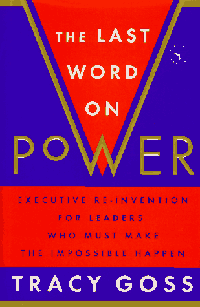Three important books are granting us a new perspective on what it means to be responsible. What’s in it for us? A better compass!
Whenever something happens that interrupts our reality we can do one of the following:
A – Put all our energy in trying to get back to how it was before (“Why is this happening to me, it’s unfair”);
B – Take it as a starting point and look for other available options (“Something interesting happened, let’s see which options we have as a result of this change”).
This is a fascinating observation in organizational change and over the past years I have done some reading in order to gain clarity on how to get from point A to point B. What I found is that the term responsibility is fundamental on this track from A to B.
A Deliberate Choice
 Responsibility is a choice, not something that happens to you. Everything becomes clear when we study the English definition for “responsible”: It literally means “able to respond” or “being capable of responding.” When people choose to take responsibility in a situation, they co-own it. This insight is fundamental for change management. We always have the choice of becoming the owner or the victim of a situation. William Glasser calls this the Choice Theory. An owner will look for solutions; a victim will search for a persecutor or a rescuer.
Responsibility is a choice, not something that happens to you. Everything becomes clear when we study the English definition for “responsible”: It literally means “able to respond” or “being capable of responding.” When people choose to take responsibility in a situation, they co-own it. This insight is fundamental for change management. We always have the choice of becoming the owner or the victim of a situation. William Glasser calls this the Choice Theory. An owner will look for solutions; a victim will search for a persecutor or a rescuer.
The Hard Stuff
 So why is it so difficult for us to make a deliberate choice? In her book “The Last Word on Power”, Tracy Goss explains that we are hard-coded to believe that there is always a way that things should be. And when they are that way, things are right. When they’re not that way, something is wrong with you, them, or it. As a human being, it is the source of our success and at the same time the source of our limitations. It defines our reality, our way of being, and our way of thinking. This, in turn, focuses our attention and shapes our actions, thereby determining what’s possible and not possible for us.
So why is it so difficult for us to make a deliberate choice? In her book “The Last Word on Power”, Tracy Goss explains that we are hard-coded to believe that there is always a way that things should be. And when they are that way, things are right. When they’re not that way, something is wrong with you, them, or it. As a human being, it is the source of our success and at the same time the source of our limitations. It defines our reality, our way of being, and our way of thinking. This, in turn, focuses our attention and shapes our actions, thereby determining what’s possible and not possible for us.
Goss offers a lot of advice on freeing ourselves from the illusion that we can control life so that it turns out “the way it “should”. Accepting that “life doesn’t turn out the way it should” is the equivalent of an alcoholic “hitting bottom”. You must go through a life-transforming experience before you can transform your relationship to the addiction and before you can move from denial to acceptance.
The Soft Stuff
 In their book ‘The Art of Possibility’ Ben and Ros Zander introduce the practice of ‘Being the Board’. According to them one cannot assign responsibility to someone else. Their practice of being the board is purely an invention and yet it strengthens you at no-one’s expense.
In their book ‘The Art of Possibility’ Ben and Ros Zander introduce the practice of ‘Being the Board’. According to them one cannot assign responsibility to someone else. Their practice of being the board is purely an invention and yet it strengthens you at no-one’s expense.
It all starts with the radical declaration: “I am the framework for everything that happens in my life”. Then, you take the practice one step further: You ask yourself in regard to the unwanted circumstances: ‘well, how is it that I have become a context for that to occur?’.
You will begin to see the obvious and less obvious contributions of your past actions and thoughts. Being the board is not about turning the blame on yourself, instead it is about access to possibility.
The Compass
In case you would like to experiment with this new practice of responsibility, here is a little compass that will help you to stay on track. From what I have read in the three books that I discussed above I have learned that there are three behavioral indications that tell me how I am doing.
1. Am I controlling or am I committing?
When I blame you for something that goes wrong, I seek to establish that I am in the right. In return I gain control over the situation. However, in as much as I blame you for something that went wrong – to that degree, in exactly that proportion, I lose my power. Life does not turn out the way it should. The only behavior I can control is my own.
2. Am I being in the past, the present or the future?
The game of “shoulds and oughts” is a blame game that gives me a sense of control because it puts me in the right. Oddly enough all these conversations either occur in the past or defer my responsibility to the future. I have no control over things that happened in the past, neither can I predict what will happen in the future.
3. Am I being right or am I being in relationship?
Whereas ‘should haves’ are commonplace in the fault game, apologies are frequent when you name yourself as the board. That is because when you look deeply enough into the question “How did that thing that I am having trouble with get on the board that I am?” you will find that at some point you have sacrificed a relationship. In the fault game your attention is focused on actions – what was done or not done by you or others. When you name yourself as the board your attention turns to repairing a breakdown in relationship. That is why apologies come so easily.



Pingback: links for 2007-10-25()
Pingback: Redefining 'Responsibility'()
Pingback: How do you Appraise? | Reply-MC()